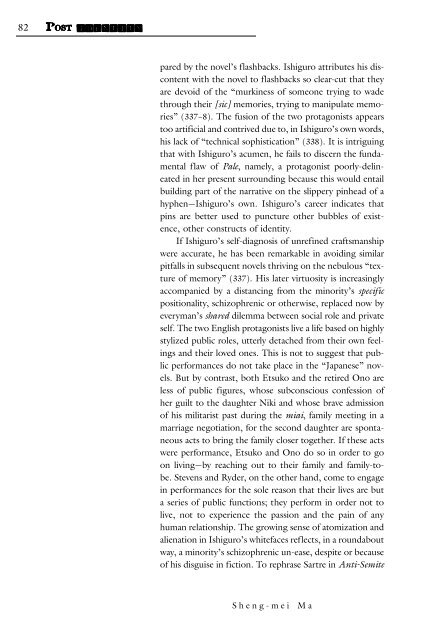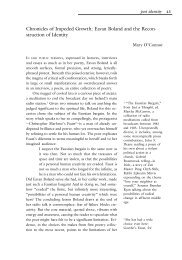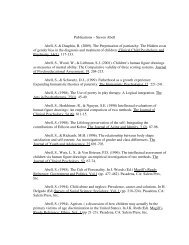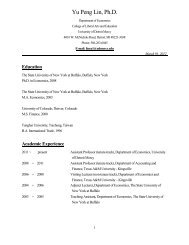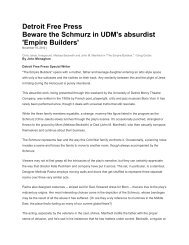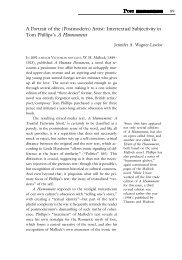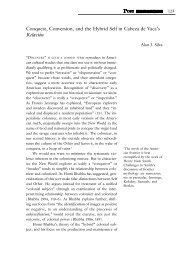Kazuo Ishiguro's Persistent Dream for Postethnicity: Performance in ...
Kazuo Ishiguro's Persistent Dream for Postethnicity: Performance in ...
Kazuo Ishiguro's Persistent Dream for Postethnicity: Performance in ...
Create successful ePaper yourself
Turn your PDF publications into a flip-book with our unique Google optimized e-Paper software.
82 POST OST IDENTITY<br />
IDENTITY<br />
pared by the novel’s flashbacks. Ishiguro attributes his discontent<br />
with the novel to flashbacks so clear-cut that they<br />
are devoid of the “murk<strong>in</strong>ess of someone try<strong>in</strong>g to wade<br />
through their [sic] memories, try<strong>in</strong>g to manipulate memories”<br />
(337–8). The fusion of the two protagonists appears<br />
too artificial and contrived due to, <strong>in</strong> Ishiguro’s own words,<br />
his lack of “technical sophistication” (338). It is <strong>in</strong>trigu<strong>in</strong>g<br />
that with Ishiguro’s acumen, he fails to discern the fundamental<br />
flaw of Pale, namely, a protagonist poorly-del<strong>in</strong>eated<br />
<strong>in</strong> her present surround<strong>in</strong>g because this would entail<br />
build<strong>in</strong>g part of the narrative on the slippery p<strong>in</strong>head of a<br />
hyphen—Ishiguro’s own. Ishiguro’s career <strong>in</strong>dicates that<br />
p<strong>in</strong>s are better used to puncture other bubbles of existence,<br />
other constructs of identity.<br />
If Ishiguro’s self-diagnosis of unref<strong>in</strong>ed craftsmanship<br />
were accurate, he has been remarkable <strong>in</strong> avoid<strong>in</strong>g similar<br />
pitfalls <strong>in</strong> subsequent novels thriv<strong>in</strong>g on the nebulous “texture<br />
of memory” (337). His later virtuosity is <strong>in</strong>creas<strong>in</strong>gly<br />
accompanied by a distanc<strong>in</strong>g from the m<strong>in</strong>ority’s specific<br />
positionality, schizophrenic or otherwise, replaced now by<br />
everyman’s shared dilemma between social role and private<br />
self. The two English protagonists live a life based on highly<br />
stylized public roles, utterly detached from their own feel<strong>in</strong>gs<br />
and their loved ones. This is not to suggest that public<br />
per<strong>for</strong>mances do not take place <strong>in</strong> the “Japanese” novels.<br />
But by contrast, both Etsuko and the retired Ono are<br />
less of public figures, whose subconscious confession of<br />
her guilt to the daughter Niki and whose brave admission<br />
of his militarist past dur<strong>in</strong>g the miai, family meet<strong>in</strong>g <strong>in</strong> a<br />
marriage negotiation, <strong>for</strong> the second daughter are spontaneous<br />
acts to br<strong>in</strong>g the family closer together. If these acts<br />
were per<strong>for</strong>mance, Etsuko and Ono do so <strong>in</strong> order to go<br />
on liv<strong>in</strong>g—by reach<strong>in</strong>g out to their family and family-tobe.<br />
Stevens and Ryder, on the other hand, come to engage<br />
<strong>in</strong> per<strong>for</strong>mances <strong>for</strong> the sole reason that their lives are but<br />
a series of public functions; they per<strong>for</strong>m <strong>in</strong> order not to<br />
live, not to experience the passion and the pa<strong>in</strong> of any<br />
human relationship. The grow<strong>in</strong>g sense of atomization and<br />
alienation <strong>in</strong> Ishiguro’s whitefaces reflects, <strong>in</strong> a roundabout<br />
way, a m<strong>in</strong>ority’s schizophrenic un-ease, despite or because<br />
of his disguise <strong>in</strong> fiction. To rephrase Sartre <strong>in</strong> Anti-Semite<br />
Sheng-mei Ma


